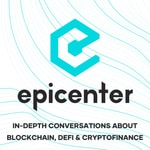Epicenter - Learn about Crypto, Blockchain, Ethereum, Bitcoin and Distributed Technologies – Détails, épisodes et analyse
Détails du podcast
Informations techniques et générales issues du flux RSS du podcast.

Epicenter - Learn about Crypto, Blockchain, Ethereum, Bitcoin and Distributed Technologies
Epicenter Media Ltd.
Fréquence : 1 épisode/7j. Total Éps: 598

Classements récents
Dernières positions dans les classements Apple Podcasts et Spotify.
Apple Podcasts
🇫🇷 France - investing
14/10/2024#99
Spotify
Aucun classement récent disponible
Liens partagés entre épisodes et podcasts
Liens présents dans les descriptions d'épisodes et autres podcasts les utilisant également.
See all- http://podcast.banklesshq.com/
1806 partages
- https://hiddenforces.io/
471 partages
- http://cointelegraph.com/
348 partages
- https://twitter.com/a16z
431 partages
- https://twitter.com/TrustlessState
371 partages
- https://twitter.com/sassal0x
225 partages
Qualité et score du flux RSS
Évaluation technique de la qualité et de la structure du flux RSS.
See allScore global : 63%
Historique des publications
Répartition mensuelle des publications d'épisodes au fil des années.
Konstantin Lomashuk: '#bitcoin is like a #memecoin' - cyber·Fund
Épisode 568
lundi 7 octobre 2024 • Durée 01:06:57
Outside of BTC’s cypherpunk movement, the early days of crypto were more or less barren in terms of innovation. However, this presented a huge opportunity for visionaries and angel investors to either launch or back bold projects, recognizing the potential of crypto stretching far beyond than just payments. One of them was Konstantin Lomashuk, co-founder of cyber•Fund which was a key actor in bootstrapping the cybernetic economy. Apart from early investments in Ethereum, Polkadot, Cosmos, Solana and many others, Konstantin recognized the potential threats to the core ethos of decentralisation and also co-founded Lido DAO in order to stave off Ethereum’s centralization risks.
Topics covered in this episode:
- Konstantin’s background
- cyber·Fund & cybernetic economy
- Entrepreneurship vs. angel investing
- Delegating tasks and scaling businesses
- Lido’s origin story
- Lido DAO proposals and improvements
- Solana vs. Ethereum
- The evolution of Ethereum’s economy
- Konstantin’s other areas of interest
- AI’s risk of centralization
- The impact of AI on crypto
- How CyberFund invests in new narratives
Episode links:
Sponsors:
- Gnosis: Gnosis builds decentralized infrastructure for the Ethereum ecosystem, since 2015. This year marks the launch of Gnosis Pay— the world's first Decentralized Payment Network. Get started today at - gnosis.io
- Chorus1: Chorus1 is one of the largest node operators worldwide, supporting more than 100,000 delegators, across 45 networks. The recently launched OPUS allows staking up to 8,000 ETH in a single transaction. Enjoy the highest yields and institutional grade security at - chorus.one
This episode is hosted by Brian Fabian Crain.
Celestia: 1Gb Blocks, Rollup Interoperability & Lazy Bridging. Ismail Khoffi & Mustafa Al-Bassam
Épisode 567
lundi 30 septembre 2024 • Durée 01:03:48
As Ethereum’s roadmap shifted to a rollup-centric approach, a plethora of rollups have been launched, to the point where L3s have been conceptualized. Celestia sits at the forefront of modularity as it aims to replace the monolithic blockchain architecture with specialized layers that are more suited for scalability and customization. As a result, Celestia strictly focuses on data availability to accommodate the recent rollup expansion, as data storage represents the largest portion of fees on L2s. The Lemongrass upgrade lays the foundation for further use cases being enabled through Celestia, mainly revolving around interoperability and zk proof enabled ‘lazy bridging’.
Topics covered in this episode:
- The vision behind Celestia
- Rollup architecture
- Centralised sequencers and the role of fraud proofs
- Celestia’s market share
- Rollkit & sovereign rollups
- Governance & light clients
- The importance of decentralisation: L1s vs. rollups
- Celestia’s data availability capacity
- Latency & Celestia block times
- Interoperability & ‘lazy bridging’
- The Lemongrass upgrade
- On-chain economics & value accrual
- Interchain accounts on Celestia
- Crypto’s mainstream adoption
- Future roadmap
Episode links:
Sponsors:
- Gnosis: Gnosis builds decentralized infrastructure for the Ethereum ecosystem, since 2015. This year marks the launch of Gnosis Pay— the world's first Decentralized Payment Network. Get started today at - gnosis.io
- Chorus1: Chorus1 is one of the largest node operators worldwide, supporting more than 100,000 delegators, across 45 networks. The recently launched OPUS allows staking up to 8,000 ETH in a single transaction. Enjoy the highest yields and institutional grade security at - chorus.one
This episode is hosted by Brian Fabian Crain.
Mel Project: Is Web3 Truly Decentralised? - Eric Tung
Épisode 558
vendredi 26 juillet 2024 • Durée 01:18:06
Web3’s decentralisation is currently limited to smart contracts as they can be verified on-chain. However, until scalability and UX become on par with that of Web2, the only realistic way for crypto to reach mass adoption is threw off-chain dApps. This creates the premise for a security bottleneck in the form of centralised APIs used for on-chain querying. Mel Project aims to expand on-chain security and decentralisation (consensus) to off-chain apps, basically achieving off-chain composability through trustless light clients. Earendil, the backbone of their ecosystem, designed to resist ISP-level censorship, is a decentralized anonymous communication and payment network that enables autonomous applications and true P2P protocols.
Topics covered in this episode:
- Eric’s background and founding Mel Project
- Why Ethereum came short
- Is Infura a security bottleneck?
- Liberating markets (and the Internet)
- Light clients and how Mel Project tackles them
- Use cases
- Smart contracts on Mel Project
- Scaling the ‘world computer’
- Mel Project’s consensus: Streamlet
- Why Mel Project chose an UTXO model
- Earendil & ISP-level censorship resistance
- Roadmap
- The Geph VPN
- Mel Project’s low volatility (stable) coin
- $SYM: PoS token
- Misc.
Episode links:
- Eric Tung on Twitter
- Mel Project on Twitter
- Geph VPN on Twitter
- Moxie Marlinspike's 'My first impressions on web3' article
- Streamlet BFT consensus model
Sponsors:
- Gnosis: Gnosis builds decentralized infrastructure for the Ethereum ecosystem, since 2015. This year marks the launch of Gnosis Pay— the world's first Decentralized Payment Network. Get started today at - gnosis.io
- Chorus1: Chorus1 is one of the largest node operators worldwide, supporting more than 100,000 delegators, across 45 networks. The recently launched OPUS allows staking up to 8,000 ETH in a single transaction. Enjoy the highest yields and institutional grade security at - chorus.one
This episode is hosted by Brian Fabian Crain.
Dev Bharel: Wormhole – The Cross Chain Messaging Protocol
Épisode 468
jeudi 3 novembre 2022 • Durée 55:09
Wormhole is a decentralized cross chain messaging protocol powering the transfer of value and information across high value chains. A network of Guardian nodes secure the protocol by observing and attesting to events and data on its connected chains. These attestations are gossiped around the open Wormhole peer-to-peer network, allowing anyone connected to the network to observe the flow of information. Portal is a bridging app built on top of Wormhole where users can seamlessly bridge tokens and NFTs across supported chains and easily enter the network’s ecosystem.
We were joined by Dev Bharel, Developer Relations for Wormhole. He gave us great insight into how the protocol works, security assumptions and incidents, the concept of generalized messaging passaging, and the Portal Bridge as a first adopter of the Wormhole protocol. We also chatted about what else is being built on Wormhole, and how you can get involved.
Topics covered in this episode:
- Dev's background and how he got into crypto
- An overview of Wormhole
- The different network ecosystems in Wormhole and challenges with adding new networks
- The Wormhole guardian network and its plans for expansion
- The user experience on Portal Bridge
- Relayers on the network
- Using Wormhole bridge assets directly with non-native tokens
- The Wormhole hack and the changes that have been made
- Using zero knowledge proof on bridges
Episode links:
- Portal Bridge
- Wormhole hack
- Bug bounty program
- Developer docs
- Wormchain
- xHack hackathon
- Wormhole on Twitter
- Dev on Twitter
Sponsors:
- Omni: Access all of Web3 in one easy-to-use wallet! Earn and manage assets at once with Omni's built-in staking, yield vaults, bridges, swaps and NFT support.
https://omni.app/ -
This episode is hosted by Felix Lutsch. Show notes and listening options: epicenter.tv/468
Vitalik Buterin: Ethereum – State of Affairs After the Merge
Épisode 467
mercredi 26 octobre 2022 • Durée 01:03:08
With the long awaited Ethereum Merge successfully executed last month, we caught up with Vitalik at DevCon in Bogota to talk shop: How does he see the state of the network, does he think looming centralization is a threat. Was Ethereum's danksharding plus third party layer 2s a good architecture decision? How much of an issue is MEV?
Topics covered in this episode:
- The state of the network and credible neutrality
- Should validators have agency?
- How much of a problem is MEV
- The Ethereum Surge
- The road to Danksharding
- Decentralizing the sequencer
- The future of the space
- The one most important thing we need to get right in the coming year for the ecosystem to succeed
Episode links:
Sponsors:
- Tally Ho: Tally Ho is a new wallet for Web3 and DeFi that sees the wallet as a public good. Think of it like a community-owned alternative to MetaMask. - https://epicenter.rocks/tallycash
This episode is hosted by Friederike Ernst. Show notes and listening options: epicenter.tv/467
Ethan Buchman & Zaki Manian: ATOM 2.0 – Deep Dive
Épisode 466
lundi 24 octobre 2022 • Durée 01:15:41
Since its announcement a few weeks ago at Cosmoverse in Medellin, Atom 2.0 has sparked intense debate in the Cosmos community and throughout the blockchain ecosystem. It proposes three pillars for the Cosmos Hub: Interchain Security, the Interchain Allocator, and the Interchain Scheduler. However, parts of the paper have been contested and debated over fears of token holder dilution, potential treasury mismanagement, and even the collapse of the Hub. We chat with Ethan Buchman and Zaki Manian to dive deep into Atom 2.0 and its vision for Cosmos moving forward.
Topics covered in this episode:
- The ATOM 2.0 announcement and follow up
- The goal of the whitepaper
- Interchain Security and its role in Cosmos' future
- Interchain Security vs. Mesh Security
- Cosmos scalability
- Liquid staking in the Cosmos ecosystem
- Distributing funds through the Allocator
- Atom issuance model
- The motivation behind the Interchain Scheduler
- The governance process - voting on the whitepaper
- Next steps to community adoption
Episode links:
- Atom 2.0 Whitepaper
- Atom 2.0 forum post
- Atom 2.0 Debate episode on The Interop
- Ethan on Twitter
- Zaki on Twitter
- Join Epicenter!
Sponsors:
- Tally Ho: Tally Ho is a new wallet for Web3 and DeFi that sees the wallet as a public good. Think of it like a community-owned alternative to MetaMask. - https://epicenter.rocks/tallycash
This episode is hosted by Sebastien Couture & Brian Fabian Crain. Show notes and listening options: epicenter.tv/466
Anett Rolikova, David Hoffmann, Joseph Schweitzer & Nick Johnson: Devcon 6 Recap – Live From Bogota
Épisode 465
samedi 22 octobre 2022 • Durée 44:44
After a 2 year hiatus, Devcon was back for its 6th and best year so far, this time in Bogota, Colombia. As things wrapped up we grabbed a few of the Ethereum community's most prominent names for a recap on the conference. Hear as we chat to Nick Johnson from ENS, Anett Rolikova from Nethermind, David Hoffmann from Bankless, and Joseph Schweitzer from the Ethereum Foundation, about their particular standouts of the event, the LatAm and wider Ethereum community, and what they see coming next for Devcon 7 and beyond.
Topics covered in this episode:
- Introductions and a look back over the conference
- The LatAm Ethereum community
- Favourite talks from the conference
- Having a booth at Devcon
- What's in store for Devcon7 next year
- The future vision for the event
Episode links:
Sponsors:
- Omni: Access all of Web3 in one easy-to-use wallet! Earn and manage assets at once with Omni's built-in staking, yield vaults, bridges, swaps and NFT support.
https://omni.app/
This episode is hosted by Friederike Ernst. Show notes and listening options: epicenter.tv/465
Devcon Panel – Censorship Resistance and Credible Neutrality
vendredi 14 octobre 2022 • Durée 50:03
Bonus Episode: At a side event at Devcon in Bogota Colombia, Friederike moderated a panel discussion on censorship resistance and credible neutrality with Phil from Flashbots, Patrick from Infura, Sebastian from HOPR, Martin from Gnosis, and Sreeram from EigenLayer. We dove deep into what credible neutrality constitutes, whether it needs defending, and if so how we should go about it.
Topics covered in this episode:
- Introduction to the panel
- What is censorship resistance and credible neutrality?
- When has Ethereum been or not been crediably neutral, and where is it today
- Recent cencorship instances in the space
- The roadmaps for more credible neutrality
Episode links:
This episode is hosted by Friederike Ernst. Show notes and listening options: epicenter.tv/B007
Cryptocito: Cosmoverse – Where Cosmonauts Unite
Épisode 464
mercredi 5 octobre 2022 • Durée 56:07
We caught up with Cosmoverse co-founder and YouTuber Cryptocito, for a chat from this year's event in Medellin. We look back on the 2nd edition of the conference and how the ecosystem has grown since last year. We also dive into some of the announcements, notably, ATOM 2.0.
Topics covered in this episode:
- Cosmoverse in Medellin
- Cryptocito's background and how Cosmoverse was born
- Highlights from the conference
- Mesh security systems
- Cosmos community growth
- Thoughts on Interchain Foundation (ICF)
- ATOM 2.0
Episode links:
Sponsors:
- Omni: Access all of Web3 in one easy-to-use wallet! Earn and manage assets at once with Omni's built-in staking, yield vaults, bridges, swaps and NFT support.
https://omni.app/ -
This episode is hosted by Sebastien Couture & Sunny Aggarwal. Show notes and listening options: epicenter.tv/464
Sebastian Bürgel: HOPR – The Peer to Peer Network Changing Data Privacy
Épisode 463
mercredi 28 septembre 2022 • Durée 01:14:45
HOPR is a decentralized and incentivized peer-to-peer mixnet open to anyone who wants to join and run a node. The network allows people, companies, and devices to exchange information online with its metadata stripped. People who communicate and transact using HOPR — or apps and services which run on top of the platform — can be sure that no-one can find out what data is being shared, who is sending or receiving it, or even how much data is being sent. HOPR gets its name from the fact that it provides metadata privacy by sending data packets through multiple nodes - or “hops” – in the network. Decentralization ensures that the network is fully independent and there is no entity that can control it or intercept the traffic.
We were joined by HOPR founder Sebastian Bürgel, who chatted about the need for a platform such as this in the space, how it works by sending packets through nodes, the HOPR token, and The DecenGov DAO.
Topics covered in this episode:
- Sebastian's background
- An overview of HOPR
- Mixnet vs onion routing
- Who is the HOPR user?
- How packets move through the network
- The distribution requirements for HOPR nodes
- The costs involved
- The HOPR token
- The DecenGov DAO
- Why privacy systems in crypto have such a hard time finding traction
Episode links:
Sponsors:
- Tally Ho: Tally Ho is a new wallet for Web3 and DeFi that sees the wallet as a public good. Think of it like a community-owned alternative to MetaMask. - https://epicenter.rocks/tallycash
This episode is hosted by Friederike Ernst & Meher Roy. Show notes and listening options: epicenter.tv/463









